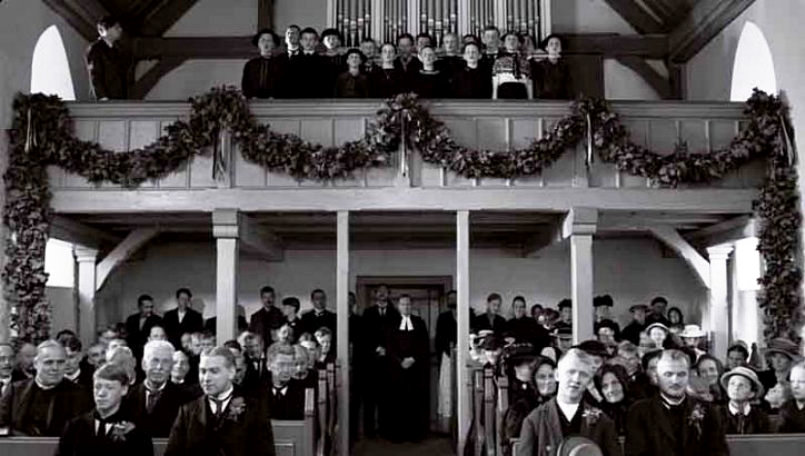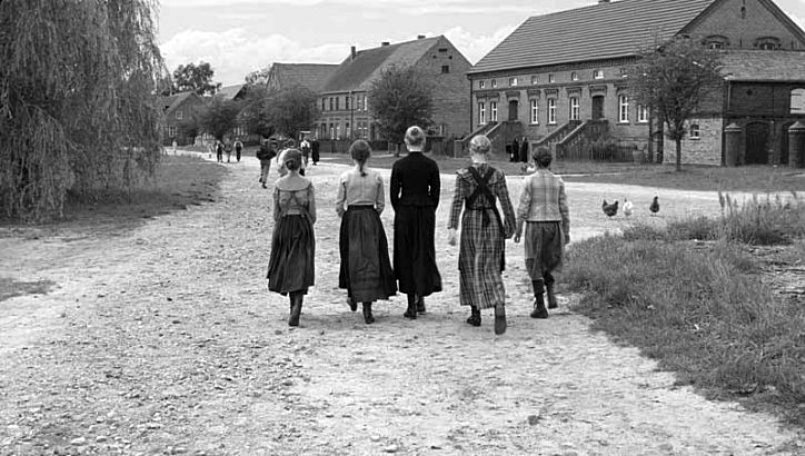
The kids are alright? Not hardly. As the second half of a Saturday double-feature with Daniel Ellsberg: The Most Dangerous Man in America, I caught the Oscar favorite for Best Foreign Film this year, Michael Haneke’s The White Ribbon. Alas, meine freunde, I found it underwhelming.
Put briefly, and while adding a frisson of Funny Games‘ Aryan youths-gone-wild to the mix, The White Ribbon attempts to do for the rise of the Nazis in Germany what Haneke’s Cache did for the French-Algerian conflict. But, at least for me, lightning didn’t strike twice. Perhaps it’s due to either knowing the trick this time ’round or having a greater familiarity with the history at hand, but I thought the allegorical content of Ribbon started out rather didactically, and only got more obvious and belabored at the movie churned along. And, shorn of its historical musings, the story here doesn’t really hold up on its own — It’s mostly just long, meandering takes of (usually) unfortunate things happening to German peasants.
First, the story. The year is 1913, and in the (fictional) village of Eichwald, a German doctor (Rainer Bock) is thrown from his horse and gravely injured, apparently due to a tripwire someone — one of the Black Hand? — placed across his path. And before this event can even be fully processed, another tragedy takes place: A worker for the local Baron (Ulrich Tukur) falls through some rotted boards to her death. Yep, Eichwald is having a frozen run of luck like you read about.
As suspicions and recriminations deepen throughout this hamlet, more troubling events ensue. An aggrieved farmer ruins the harvest festival by slaughtering all the Baron’s cabbages. The Baron’s young son is taken by unknown parties and brutally horsewhipped (for some reason, and as in Doubt, nobody ever thinks to ask the kid who did this to him.) Fires are set, folks disappear (or leave while they still can), birds are mutilated, and, perhaps most frightening, even souls are in peril: For example, the son (Leonard Proxauf) of the local reverend (Burghart Klaubner) puts his eternal salvation in doubt by indulging in a nasty habit of onanism. To be sure, this evil must be beaten out of him, and his siblings, as soon as possible. In other words, we must destroy these children in order to save them.
Narrating this tale throughout (as an old man, years on) is the local schoolteacher (Christian Friedel), who, as a relatively young newcomer to the village, stands between its feuding generations. When not courting the Baron’s young nanny (Leonie Benesch), he watches the events unfolding in town with growing unease, and tries to figure out who is responsible for all the incidents driving the citizens of Eichwald mad. The problem is, he’s already tipped what’s actually going on in the very first scene of the movie, when he says something along the lines of “This is not just the story of a random German village, but the story of my nation.” Ooh, really? Allegory time.
Pretty soon thereafter, we are regaled with a scene where the Reverend’s children are taken to the proverbial woodshed and unduly punished for their transgressions, real and imagined. Given both the time I’ve spent on this subject in recent years and the schoolmaster’s “time to play German History Jeopardy!” warning in the first scene, this set off Versailles Conference bells and alarms right away, and especially so once these children are then forced to wear white ribbons as symbols of purity. Hmm…who else in 20th century German history ran around wearing armbands? Let me think on it.
The rest of the story pans out as you might expect. For various reasons, predominant among them the Sins of the Father(s), these kids go terribly wrong, eventually even going so far as to attack a developmentally disabled boy (i.e. the local minority in their midst.) Also, for some reason, the movie is constructed like a mystery, even tho’ — even if you didn’t pick up on all the hints in the last paragraph — one of the kids basically confesses to the schoolteacher what’s going on in the first reel. Uh, can we speed this along? Bitte?
I’d like to say The White Ribbon remains engaging despite all of its allegorical ambitions. But it doesn’t, really. When you’re not playing spot-the-German-history as it goes along — Is the Baron supposed to be Kaiser Wilhelm? Are we gonna get a Beer Hall Putsch? Hey, look, Pius XII! — Ribbon mostly just offers long, intermittently interesting digressions on agrarian village life, like harvest festivals, courting carriage-rides and the cruelest break-up of the German pre-war period. (Some of this plays a bit like Todd Haynes’ Far from Heaven — A period film, told in period (B&W) style, with then-taboo subjects like incest, sexual assault, and the aforementioned onanism now thrown in.)
Simply put, there’s not enough story to sustain interest in this enterprise without the allegorical content that’s driving the movie. And, since this allegory was tipped in the opening half-hour, I pretty much just spent most of The White Ribbon waiting for all the various little Nazi shoes to drop. Without either the ambiguity or the open-endedness of Cache, I found The White Ribbon on the pedantic and stultifying side, and I can’t really recommend it. It’s not terrible or anything, but it is rather long and uninvolving, and I have to think one of the other Foreign Film contenders probably puts on a better show.

